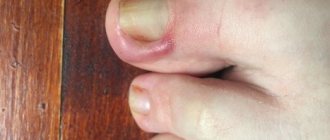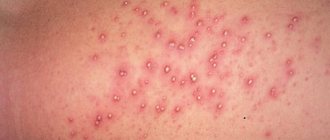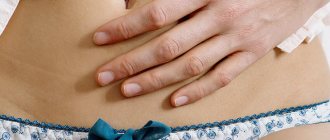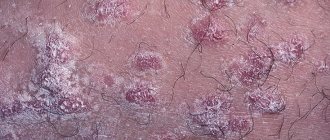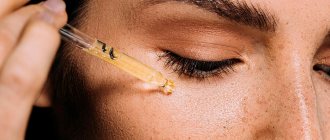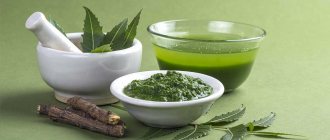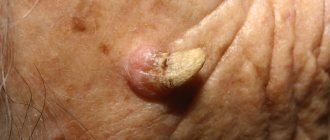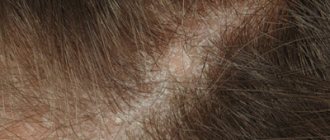When excessive sweating of the head and face is observed, a diagnosis of craniofacial hyperhidrosis is made. It is characterized by the release of a large amount of fluid from the sweat glands in the scalp, forehead, cheeks, nasolabial triangle, temples, and neck. Its appearance is preceded by the formation of a sensation of intense heat. The skin becomes red, then perspiration appears, and as a result, drops of sweat appear. A woman experiencing such discomfort becomes emotionally excitable. If left untreated, a strong specific odor occurs. It is a sign of the proliferation of bacteria, for which moist skin becomes a favorable environment for active reproduction.
Features of sweating
Sweating of the head is not always considered a pathology. The fact is that on this part of the body there is a fairly impressive number of glands, so the secretion of their secretion is quite normal. However, this statement is only true if the liquid is released in small quantities and evaporates quickly. If sweat runs down your face, and the hair at the roots and the pillow are constantly wet, then this is already a pathology. This condition requires correction.
Increased sweating can be local or general. In the first case, only certain areas sweat, and in the second, the whole body sweats. It is worth noting that very often a person thinks that only his head and feet sweat because sweat evaporates worse in these places.
You can hear the opinion: you can understand that sweating is caused by the presence of pathology by a specific “sour” smell. This is partly true. However, you need to understand that in adults, sweat initially has a mild odor, but after some time it acquires a fairly strong aroma.
Sweating of the head is diagnosed not only when the skin under the hairline sweats. This concept also includes some parts of the face. Which parts sweat with scalp hyperhidrosis:
- Part of the head covered with hair;
- Forehead and temples;
- Area of the nasolabial triangle.
Also, sweating of the head is usually accompanied by the release of this secretion on the palms. However, this phenomenon is not always observed.
With symptoms of excessive sweating, you need to be especially wary if they appear suddenly. In this case, we can say with almost complete certainty that the cause of hyperhidrosis is pathology or a negative external influence.
What inconveniences does excessive sweating of the head cause?
Hyperhidrosis of the head in itself is very unpleasant. In addition, this condition may indicate a number of serious diseases. Therefore, it cannot be ignored. In addition to the fact that excessive sweating can be caused by various pathologies, it also causes a lot of inconvenience to its owner. Some of them really prevent a person from feeling confident.
Unpleasant sensations associated with sweating of the head:
- Due to hyperhidrosis, the patient's head looks constantly dirty. After all, sweat has a slightly sticky substance to which dust sticks;
- With increased sweating, sebum secretion also increases. This also negatively affects the appearance of the hair;
- Also, this problem is fraught with irritation of the skin. Due to the fact that these areas of the body are constantly wet, prickly heat and irritation may appear on them;
- Oily seborrhea is another unpleasant consequence of head sweating;
- Night sweats prevent a person from getting enough sleep. After all, sleeping on a wet pillow is unpleasant for anyone.
That is why sweating of the head is difficult to ignore. After all, such a problem can not only signal the development of pathological processes, but also reduce the standard of living.
Botox for the treatment of hyperhidrosis of the head and face
The Botox injection procedure in our clinic is performed by experienced cosmetologists. This procedure does not require special preparation; it is only important that there are no areas of inflammation on the face, neck or under the hair.
The doctor makes several injections in the areas of the most severe sweating of the head or neck: the needle of the syringe is so thin that the procedure does not even require additional anesthesia, the patient experiences virtually no discomfort. Immediately after the procedure, you can return to your normal lifestyle; no additional rehabilitation is required.
The pronounced effect of Botox injections will be noticeable already on the 3-4th day and will last up to 8 months, then the procedure will need to be repeated.
Causes of sweating head
The causes and treatment of excessive sweating of the head in women are interconnected. Therefore, when such a symptom occurs, you need to understand why it appeared. The method of eliminating it will largely depend on this.
Increased sweating may be observed due to the influence of external factors. However, such reasons are not difficult to notice. Also, this situation often arises due to the fact that a person makes lifestyle mistakes during the day. Such factors are easy to eliminate.
The most dangerous cause of cerebral hyperhidrosis are the diseases that cause it. In this case, timely diagnosis will help avoid serious consequences and complications.
Pathologies inside the body that cause sweating
The most dangerous causes of hyperhidrosis are various diseases. That is why it is so important to consult a doctor promptly if such symptoms appear. Why does my head sweat a lot?
- Primary hyperhidrosis is diagnosed in the presence of the disease of the same name. This is a genetic abnormality in the functioning of the sweat glands, which is passed from relative to relative;
- Sweating may be a sign of vascular pathologies. This condition is typical for people suffering from hypertension;
- Heart disease can also cause hyperhidrosis. For example, heart failure leads to this syndrome;
- It is also likely that this problem is associated with endocrine disorders. For example, almost every person suffering from diabetes experiences excessive sweating;
- Obesity is another disease that causes sweating of the head. Overweight people often suffer from hyperhidrosis;
- Increased sweating may also occur when body temperature rises. This is how the body carries out thermoregulation;
- Tumor processes of malignant and benign types cause increased sweating;
- Infectious and viral diseases are another cause of scalp hyperhidrosis;
- For example, HIV-infected people often suffer from this problem;
- Dermatological diseases can cause sweating of the head. It could be a fungus, dermatitis, etc.;
- Apnea causes night sweats. This reason may be caused by other factors.
Such diseases threaten health. Moreover, the sooner the pathology is noticed, the greater the chance of curing it without consequences. It is worth clarifying the difference between secondary and primary hyperhidrosis. In the first case, sweating is caused by congenital characteristics of the body, and in the second - by pathological processes. Also, internal causes of scalp hyperhidrosis include pregnancy, menopause, menopause and puberty. However, such factors are not diseases.
Predisposing factors
Excessive sweating of the head and face is normal only in case of seasonal heat, being in a stuffy room, in a sauna or bath, as well as during intense physical activity and treatment with antipyretic drugs. In other cases, clinicians consider the appearance of hyperhidrosis to be a pathology. There are two key forms of local hyperhidrosis:
- primary;
- secondary.
In the first case, excessive sweating appears by the age of 13-15, and its peak is at 22 years. Primary hyperhidrosis is caused by a hereditary predisposition. In the second case, hyperhidrosis is a characteristic symptom of some pathology, dysfunction of organs and systems. The following are the main pathological causes of chronic perspiration on the forehead in women.
Endocrine disorders
The function of the pituitary gland and thyroid gland is directly related to the functioning of all organs and systems of the body. A slight disruption in the secretion of thyroid hormones can trigger the development of hypothyroidism or hyperthyroidism. Both pathologies define a wide range of thyroid dysfunction:
- long-term hormone therapy;
- Graves' disease;
- nodular goiter in the elderly;
- tumors in the body of the pituitary gland;
- excess iodine content:
- disruption of the kidneys and adrenal glands.
The correct diagnosis can only be made by an endocrinologist based on the patient’s general clinical history, his age, gender, professional conditions, and region of residence. Proper treatment of thyroid diseases helps alleviate overall health and eliminate not only sweating, but also headaches, swelling, attacks of tachycardia and causeless nausea.
Reasons related to the cleansing functions of the sweat glands
It is also worth noting several situations where sweating of the head is a protective reaction of the body. In this situation, such a symptom is invaluable. Causes of severe sweating of the head in women:
- This situation can occur during poisoning. With the help of increased work of the sweat glands, toxins and harmful substances are removed from the body.
- Another reason is the abuse of harmful substances. Smokers, alcoholics, and people addicted to drugs are more prone to sweating. Thus, the body tries to cope with a large number of harmful substances that, due to bad habits, abound in the blood. Such factors lead to improper metabolism.
- It is also common for the head to sweat heavily at night after illness. This is necessary to remove decay products of bacteria, immune cells, and medicinal substances.
Diagnosis of hyperhidrosis: what examinations are prescribed for women
To identify the cause of severe local sweating in a woman, doctors conduct an examination using laboratory and instrumental methods:
- taking anamnesis;
- physical examination;
- gynecological examination;
- collection of urine and blood tests;
- ultrasound examination of the pelvic organs;
- Ultrasound of the thyroid gland;
- chest x-ray.
Based on the diagnostic results, the doctor may prescribe additional tests (MRI or CT). However, in most cases, it is enough to check the composition of the blood to make a diagnosis.
With insufficient scalp hygiene, sweating increases
Harmless causes of sweating
Increased sweating can also occur when exposed to external factors. However, some of them are absolutely harmless and do not cause harm to health. Harmless causes of sweating:
- Walking in the summer with long hair. This factor is not harmful to health and is difficult to eliminate. This problem is typical for women;
- Physical activity as well as mental work. For such reasons, the body forces the sweat glands to work harder;
- Too vivid dreams can also lead to this reason. This factor is also absolutely harmless and it is extremely difficult to control its occurrence.
Foods that cause sweating
Some foods enhance the functioning of the eccrine glands, and certain types of food cause a clear metabolic and endocrine response in the form of increased sweating within half an hour after eating:
- all types of legumes;
- pepper;
- onion garlic;
- coriander, ginger, cinnamon;
- tea, coffee, chocolate;
- pork;
- most carbonated and energy drinks.
For cranial sweating, it is recommended to eat a balanced diet, but limit the use of hot spices. Mustard, horseradish, garlic, chili pepper or other products cause the body to increase heat transfer, which leads to active sweating. Capsaicin, which is found in hot spicy foods, is responsible for this.
Excessive sweating can be caused by both hot drinks and hot food, so it is better to give food time to cool and eat it warm.
How to treat
The problem of excessive sweating, caused by various factors, does not have a single solution. Each patient requires a separate treatment regimen. Self-activity in this matter is not appropriate. It is necessary to undergo a full diagnosis and obtain advice from specialized specialists. Treatment may include both traditional medicine and traditional medicine.
Sweating due to poor lifestyle
Errors in lifestyle can also cause sweating. Such factors can harm your health. However, they are quite easy to eliminate. Why do adults sweat a lot?
- One of the reasons for sweating is too hot a climate. In summer, this problem is present in most women and men who wear long hair;
- Unsuitable room temperature can also lead to this problem. Too dry or humid air also contributes to this;
- Also, women and men who do not wear a hat in winter often have sweaty heads. In this way, the body tries to normalize the temperature balance;
- Lack of vitamins and minerals causes hyperhidrosis. This problem is especially often caused by a deficiency of vitamins B and D;
- Do not forget about such a factor as poor nutrition. Some foods may cause excessive sweating;
- Lack of personal hygiene should also be considered an unfavorable factor that causes sweating. This can happen due to wearing dirty hats, as well as infrequent hair washing;
- Another possible cause of sweating is wearing hats that are too warm. For example, fashionistas love to wear hats made of warm materials during the hot season.
Why night sweats are considered the body's most dangerous signal
There is an opinion that night sweats are the most dangerous symptom. And this conclusion is partly true. After all, during sleep a person is in a state of complete rest, so there is a high probability that this problem is caused by a disease.
Any of the illnesses described above can cause night sweats. However, this phenomenon is most typical for diseases such as tuberculosis. This sign is even included in the list of main symptoms of this pathology.
Also, sweating of the head is characteristic of apnea. This disease causes significant discomfort to the patient and can even lead to the most dire consequences. Of course, we should not exclude external factors. If the room is too hot, the patient does not maintain personal hygiene and eats before bed, then hyperhidrosis will be a completely expected consequence.
Diagnosis of the problem
Since sweating of the head is one of the signs of a fairly impressive list of diseases, it is very important not to ignore it. With such a symptom, you should definitely consult a doctor. To find out the causes of this symptom, the specialist will examine the patient and prescribe the necessary tests. A referral for a general and biochemical blood and urine test is required. It is also possible to sample sweat to determine its composition.
Once the test results are received, the therapist will be able to draw conclusions regarding the cause of the disease causing hyperhidrosis. After this, the patient will be referred to more specialized specialists. Most often, examinations are prescribed by an endocrinologist, dermatologist, phthisiatrician and cardiologist. The patient is also sent for instrumental examination.
Treatment of the disease
Treatment for sweating largely depends on the cause that caused it. Therefore, this is impossible without diagnostics. Drug therapy is usually used. Drugs are selected depending on the specifics of the problem. These can be anti-inflammatory, anthelmintic, antibacterial and other drugs.
It is also very important to normalize your diet. This step will be useful for absolutely any disease. In addition to drug treatments, physiotherapy can be used. They will help speed up your recovery. Drastic measures are used only as a last resort. They involve surgery and minimally invasive techniques.
Eliminating negative factors
It is extremely important to eliminate the factors that cause excessive sweating. It is possible that this will help solve the problem with sweating. However, even if not, a correct lifestyle will not harm anyone.
Elimination of negative factors:
- It is very important to observe the rules of personal hygiene. If you sweat excessively, you should wash your hair daily to keep your hair clean all the time. It is also very important to wash hats and bedding regularly;
- Choosing the right clothes also matters. You should not wear hats that are too warm in summer and too cold in winter. You should also give preference to bed linen and hats made from natural fabrics;
- Normalization of nutrition is also of great importance. The diet should be healthy and balanced;
- It is also necessary to normalize the microclimate in the room. To do this, you need the room to be no warmer than 20 degrees and no colder than 18. Humidity should be within 50%. Regular ventilation of rooms in the summer is very useful;
- In hot weather, it is advisable to remove your hair. You don’t have to have a short haircut for this, you can just put it in a bun or ponytail.
Diet
Proper nutrition plays a very important role. Of course, to create a detailed diet, it is better to consult a nutritionist. However, there are several rules that will be useful to absolutely everyone. Nutrition rules:
- It is necessary to avoid hot and spicy foods. Such foods cause increased sweating;
- You also need to remove smoked meats and pickles from your diet. They negatively affect the functioning of the kidneys and liver, causing increased sweating;
- Avoid drinking coffee and carbonated drinks. They can be replaced with a decoction of herbs or green tea with honey;
- You need to eat more foods containing B vitamins. These include eggs, whole grain bread, cottage cheese, etc.;
- Minimize your consumption of alcoholic beverages. In the absence of contraindications, sometimes you can allow yourself a glass of dry red wine;
- You need to cook food by steaming, boiling and baking. It is better not to eat fried fatty foods;
- You need to eat no later than three hours before bedtime. Otherwise, sweating will increase at night.
If a person is obese, then following these rules alone will not be enough for him. In this case, you need to contact a nutritionist who will create a diet that can help you lose extra pounds without harming your health.
Folk remedies
Folk remedies can also help cope with the discomfort from excessive sweating. These methods will prevent skin irritation and rashes. To solve this problem, you can rinse your hair with herbal decoctions. This could be a remedy containing a decoction of chamomile, oak leaves or calendula. If sweating is caused by stress, then traditional healers have advice on this matter. Motherwort tincture, lemon balm tea, and valerian tincture can help.
These methods can only be used as an addition to the main treatment. It is important to take into account that folk remedies have their contraindications. Therefore, you should consult your doctor before using them.
Cardinal methods
Cardinal methods include minimally invasive treatment methods and surgery. They are used if other options for combating hyperhidrosis do not help. Surgery involves pinching the nerves that interact with the sweat glands. This treatment method allows you to get rid of sweating forever. However, it is rarely used for the head. Another option is to inject Botox under the skin. This remedy paralyzes the nerves communicating with the sweat centers. The results from this method last up to eight months.
Sweating of the head is an unpleasant symptom that causes severe discomfort. It can be a consequence of many reasons. And if it occurs, you need to contact a specialist.
Prevention
If you are prone to cranial hyperhidrosis, you can help yourself with the following preventive measures:
- control your emotional state;
- try to avoid stressful situations;
- choose hairstyles that do not lead to blood stagnation;
- stop using styling products frequently;
- wash your hair with cool water;
- choose the right filling and pillowcase for the pillow;
- undergo regular medical examinations and treat the underlying disease;
- to refuse from bad habits.
With increased nervous excitability, you can resort to aromatherapy, relaxing baths and sedatives based on medicinal plants.
